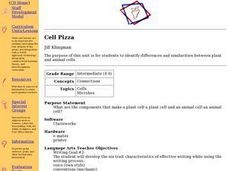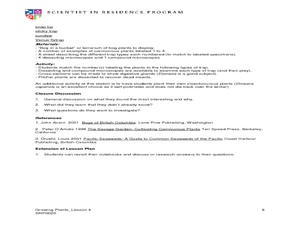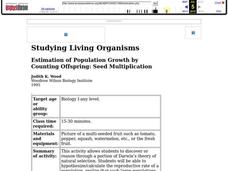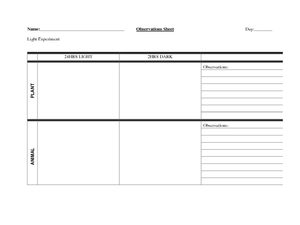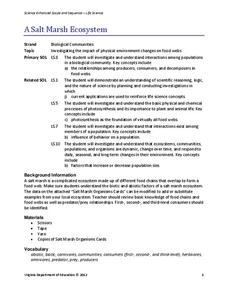Curated OER
Lesson 2: the Cell Cycle
Students explain how cells reproduce. In this biology lesson, students explain the different stages of the cell cycle. They calculate the number of new cells produced.
Tech Museum of Innovation
Seed Dispersal
Engineering challenges are not just man-made ... nature has its own set of them. A hands-on STEM activity has groups designing a seed dispersal system. Each group can only use one sheet of paper — a tough task!
Curated OER
Pollination
Fourth graders explore the pollination process. In this plant biology lesson, 4th graders dissect a flower to identify the parts of a flower and watch a video to see seed dispersal. Students write about the pollination process.
Curated OER
Let's Start Growing
Students investigate how a tree grows from a seed. In this plant biology lesson, students use potting soil, tree seeds, and a paper cup to observe seeds growing into plants. Students record observations in their science journals.
Curated OER
Do you see what I see?
Students examine the importance of making and recording observations and accurately describing an object. In this biology lesson students work in groups and report to the class what they learned.
Curated OER
Cell Pizza
Students identify parts and functions of microscope. Students watch video, Cells and Life about cell parts with actual pictures and actual cells. Students discuss video and identify parts of the cells that animals and plants have in...
National Wildlife Federation
Citizen Science to the Rescue!
You don't have to be a scientist or even out of high school to contribute to scientific research. In the 12th instructional activity in the series of 21, scholars use this opportunity to add to the growing body of scientific knowledge...
Curated OER
Nitrogen Fixation, OR What a Gas!
Students gain skill in the design, implementation, and reporting of a scientific research project using the scientific method. They set up an experiment to determine the effect of adding the Rhizobium bacteria to one group of legume...
Curated OER
Insects!
Students explore the diet of insects. In this "insects" biology lesson plan, students take a nature walk and collect various natural materials they think may be eaten by insects. Students sort and classify these materials into three diet...
Curated OER
It's Challenging Being Green!
Students influence the plant life cycle as they take care of plants.In this caring for plants lesson, students understand the parts of the plant and their functions in keeping it alive. Students participate in experiments with plants and...
Salt River Project
How Do We Clean Polluted Water?
How do we clean up oil spills and other pollutants in the water? Explore water treatment strategies with a set of environmental science experiments. Groups remove oil from water, work with wastewater treatment, and perform a water...
Illinois Department of Natural Resources
Section One: What is Biodiversity?
Four intriguing and scientific activities invite learners to explore the natural resources of their town. The activities cover concepts such as genetic traits, organizing species in a taxonomy, the differences between different species...
Serendip
Evolution and Adaptations
Survival of the fittest isn't just for the movies! A five-part lesson explores several different species with known adaptations and analyzes them for their survival strategies. Using both video and research data, scholars draw...
Curated OER
Genetically Modified Foods
Students explain what genetically modified foods are and how they are created. Students use appropriate vocabulary to describe and effectively discuss the benefits of, and potential risks of, genetically modified foods.
Curated OER
Clam Word Search
In this clam vocabulary worksheet, young scholars recognize words that relate to clams. Students complete the word search by finding all of the nine clam words.
Curated OER
How is Rice Harvested?
Second graders look at how rice is harvested. In this rice harvesting instructional activity, 2nd graders learn vocabulary associated with rice harvesting. They read or listen to a study guide before making Squishy Rice Balls from...
Curated OER
Microscopy Exercises
Students explore organisms and botany by utilizing microscopes. For this microscopic research lesson, students define many plant and organism related vocabulary terms such as conifers, moss and spores. Students view spores and other...
Curated OER
REPRODUCTION
Students complete a variety of activities to study different concepts in Science. The activities are part of a layered curriculum. This is used to differentiate instruction and give a wide variety of assessment opportunities.
Curated OER
Limu and ME!
Students explore limu. In this cross curiculum botany and art project, students view a limu-picking film and then collect several species of limu. Students follow a sequence of instructions using limu, card stock and wax paper to create...
Curated OER
Molecular Evolution in Plants
Students examine chlorophylls. They explore the absorbing pigments in a variety of plants. Through activities, students determine spectrophotometrically. They compare plant proteins from the family Brassicace to assess the level of...
Curated OER
Molecular Evolution in Plants
Students are using a paper chromatography study that is suitable for introductory biology. The absorption spectra studies and gel electrophoresis studies are appropriate for students who have complete both introductory biology and...
Curated OER
Estimation of Population Growth By Counting Offspring: Seed Multiplication
Students calculate the reproductive rate of a plant that creates multi seed fruits. They graph exponential growth and the complete a series of questions that help them infer that natural selection processes are at work in this population.
Curated OER
Organisms – Their Needs
Students compare and contrast different organisms characteristics. In this life science lesson, students design an experiment about plants and animals needs. They collect data and write their conclusion about the experiment.
Virginia Department of Education
A Salt Marsh Ecosystem
What a web we weave. Pupils use yarn as the primary resource to create a web depicting the intricacies of a salt marsh ecosystem. They participate in a question and answer session, which leads to an in-depth facilitated discussion about...







